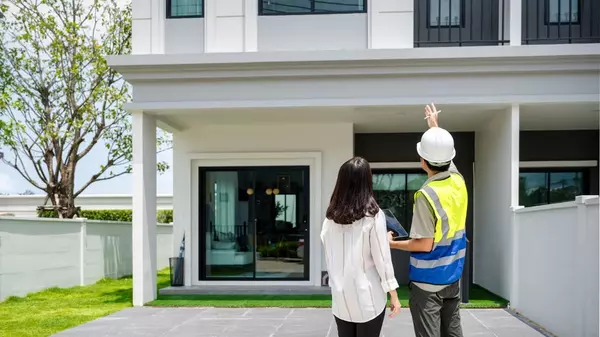Understanding the Home Inspection Process When Buying a Home in Arizona: What Every Buyer and Seller Should Know

Navigating the Home Inspection Process in Arizona
Buying a home is an exciting milestone—but it also comes with a lot of moving parts. One of the most important steps in the Arizona homebuying process is the inspection period. This is where buyers get a clear picture of the property’s condition, while sellers have a chance to show that the home is well-maintained and ready for new ownership. When everyone understands what to expect, the inspection process can be smooth, collaborative, and even empowering.
Let’s walk through how it works, what’s typically inspected in Arizona homes, and how a good agent helps guide buyers and sellers through it all.
Why Home Inspections Matter
Home inspections give buyers a professional, objective view of the home's condition—everything from the foundation to the roof, and all the systems in between. This step is a safeguard, allowing buyers to identify any surprises upfront and make informed decisions before finalizing their purchase. In a competitive market like Arizona, having an inspection contingency in the contract can also offer peace of mind—knowing there’s a way out if serious issues are discovered.
It’s not just about finding problems—it’s about understanding what you’re investing in, setting expectations, and knowing what’s next.
The Timeline for Inspections in Arizona
Once the purchase contract is accepted, the clock starts ticking. In Arizona, buyers typically have a 10-day inspection period to complete all evaluations and submit any repair requests. A good real estate agent will help schedule inspections right away, keeping everything on track and within that deadline.
What Inspections Are Common in Arizona?
A general home inspection is a must, but depending on the type of home, its age, or location, additional inspections are often recommended. Arizona has its own environmental and structural quirks (like heat wear and aging roofs), so it’s important to go beyond the basics.
Here are the most commonly recommended inspections in Arizona:
- General home inspection
- Roof inspection
- HVAC inspection
- Termite inspection
- Sewer scope inspection (especially on older homes or those with mature trees)
- Pool inspection (if the home has one)
A good agent will connect buyers with reputable inspectors and guide them on which inspections are appropriate for the property in question.
What Happens on Inspection Day
The inspection itself usually takes a few hours, depending on the size of the home. The inspector will evaluate major systems and components such as:
- Roof and attic
- Foundation and structure
- Plumbing systems
- Electrical systems
- Heating and cooling (HVAC)
- Appliances
- Windows and doors
- Interior and exterior conditions
- Possible pest activity (including termite evaluations when needed)
Buyers are always encouraged to attend the inspection if they can. It’s a chance to walk through the home with the inspector, ask questions, and get a better feel for the condition of the home beyond what’s written in the report. A knowledgeable agent will be right there too, helping point things out and ensuring all concerns are addressed in real time.
Reviewing the Report
A day or two after the inspection, the buyer receives a full written report. This typically includes photos, notes, and recommendations—ranging from small repairs to larger concerns. It can feel like a lot, especially if this is your first time buying a home, but it’s completely normal for even well-kept homes to have a list of items flagged.
This is where having a trusted agent by your side makes all the difference. A great agent helps break down the report, highlight what matters most, and help you work through what’s worth negotiating versus what’s just part of regular homeownership.
How Repairs and Negotiations Work
After reviewing the report, the next step is deciding how to proceed. In Arizona, buyers use a document called the BINSR (Buyer’s Inspection Notice and Seller’s Response) to either accept the home as-is or request repairs or credits.
Most buyers focus repair requests on material defects—things that impact the safety, structure, or function of the home. Think: roof leaks, electrical hazards, plumbing issues, or foundation cracks. Cosmetic concerns like worn carpet or older fixtures typically aren’t part of this conversation unless discussed during initial negotiations.
Sellers have a few options. They can agree to all the repairs, counter with alternatives (like a credit toward closing costs), or decline the requests entirely. What happens next often depends on market conditions, how motivated each party is, and how severe the issues are.
A skilled agent will guide buyers through this process—ensuring their investment is protected while keeping negotiations constructive and on track to close.
Seller Responsibilities During Inspections
Sellers have an important role to play in the inspection process too. A well-prepped home can make a big impact. That means ensuring the inspector can easily access all key areas like the attic, electrical panels, and mechanical systems. It’s also important that all utilities (including gas) are turned on for the inspection, so everything can be properly tested. Taking care of minor maintenance beforehand and having the home in good working order helps the inspection process go more smoothly and builds buyer confidence.
Some sellers even opt for a pre-listing inspection to get ahead of any potential issues before the home hits the market in competitive or high-end markets. Although this can also lead to disclosures. Connect with your agent about your stratagy to see if doing an inpsction prior to listing makes sense.
Wrapping It All Up
The inspection process can feel overwhelming at first, but with the right guidance, it becomes a valuable tool for both buyers and sellers. For buyers, it’s about gaining clarity, confidence, and a game plan. For sellers, it’s a chance to show that their home is cared for and ready for the next chapter.
And as always—if you have questions or need help navigating this process, I’m just a message away. Whether you’re getting ready to buy or prepping to sell, I’ve got the tools, the team, and the local expertise to support you every step of the way.
-Kendra Dursteler
Real Estate Advisor, Realtor®
Categories
Recent Posts










GET MORE INFORMATION

